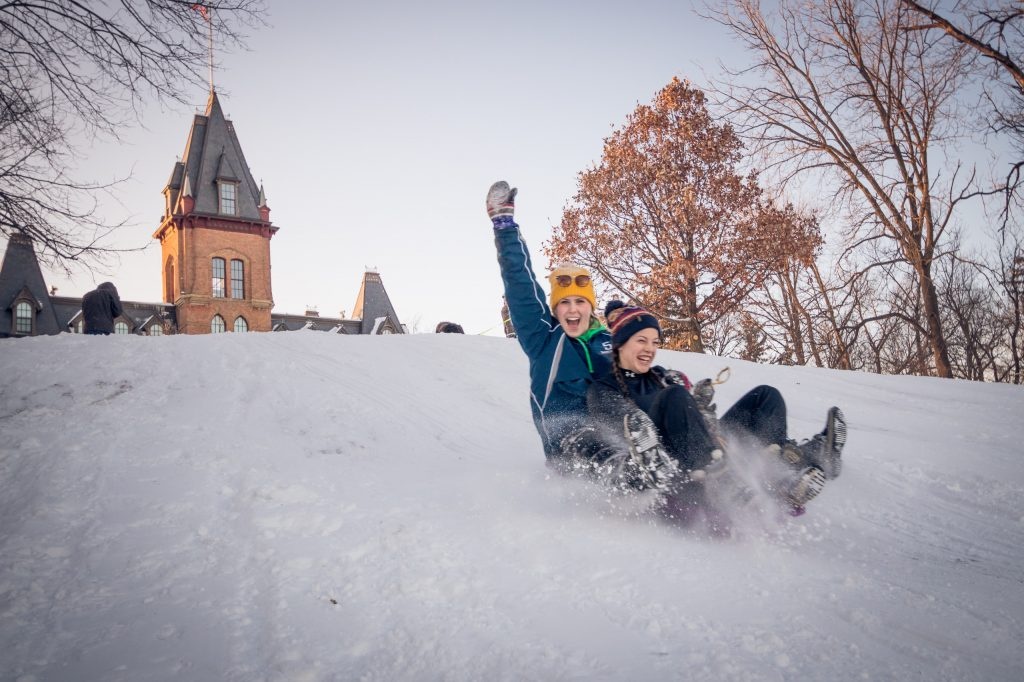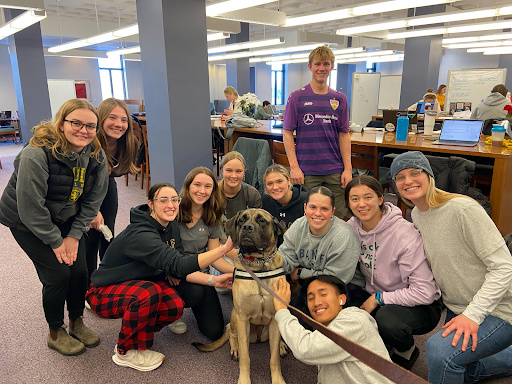January
In this month’s edition:
- All About January Term
- First-Year January Term Programming
- Public Safety News
- Winter Wellness Tips
- Disability and Access Center Reminders
All About January Term

January Term (J-Term) is already here! Whether this is your Ole’s first or fourth, this information will help answer some of the most common J-Term questions.
How many classes will my Ole take?
Your Ole will take one class during the month of January. Unlike semester-long classes, most J-Term classes meet for at least two hours Monday–Friday. A class session is required on the first day and the last day of the January term for examination or evaluation purposes. No classes will be held on Monday, January 20, in observance of the Martin Luther King Jr. holiday. While some common prerequisite classes (classes such as Principles of Economics and Introduction to Cultural Anthropology) are restructured to fit the condensed time frame, many classes are unique and offered only during January Term.
Why does St. Olaf have a January Term?
January Term is a four-week period of intensive study in one area and provides an opportunity for instructors and students to focus their entire attention on one course for a full month. It offers time for single-minded in depth study, time for unique teaching and learning styles in traditional courses, and opportunities for unique subjects to be studied abroad or away. Overall, the 4-1-4 academic calendar plan improves the quality of academic instruction by concentrating student effort on fewer courses at one time and by providing additional opportunities for independent study or academic internships.
For more detailed information about January term, please consult the academic catalog.
Who is on campus?
All first-year students (with a few exceptions) will be on campus. The makeup of sophomores, juniors, and seniors on campus tends to vary and depends on who is participating in study abroad/away programs as J-Term is a very popular time to take a course off campus. While there are fewer students on campus than during the regular semesters, the campus certainly doesn’t feel empty. There are many music, theater, and athletics events as well as other activities to keep students busy.
Does my Ole have to take a class every January Term?
All first-year students are required to take a J-Term class on campus. After their first year, Oles can choose to enroll in a class on campus, participate in a J-Term study abroad/away program, or complete an academic internship for credit. In total, your Ole must complete 3 full J-Terms in order to graduate.
How much does January Term tuition, room, and board cost?
As long as a student is registered full-time during fall and/or spring semester, they are eligible to take one on campus course at no additional cost of tuition, room, or board. Course fees vary by course and will be billed upon registration. Your Ole should make sure they select their meal plan for January and Spring in SIS (Student Information System) under Financials > Meal Plans. The deadline to select their plan for J-Term is January 7, and spring semester is February 10.
A Highlight on First-Year J-Term Programming

The Office of Orientation and Transition Experiences is excited to welcome your Ole(s) back to campus this January. The transition from their first extended college break can bring new challenges. To help ease this adjustment, we’ve designed a series of programs tailored to foster connection, encourage healthy habits, and brighten the typically cold winter days of J-Term.
Here’s what’s happening in January:
- Connection Dinner
Thursday, January 9 | 5:30–7 p.m. | By invitation only
An opportunity for students to reconnect with — and meet new — peers and build meaningful relationships over a shared meal. - Jan Fest
Saturday, January 18 | 8–11 p.m.
An active event to energize the campus community with fun and engaging activities, including an award-winning, and always entertaining Sailesh, the Hypnotist! - Self-Care & Safety Fair
Tuesday, January 21 | 7–8:30 p.m.
A resource fair promoting well-being and safety tips tailored to the unique demands of the winter season and the focused pace of a one-course J-Term.
These events aim to create a supportive environment for your student(s) to thrive academically, socially, and emotionally during this transitional period. The content of these events are based on feedback we received from their mid-year SOAR survey and their post New Student Orientation Assessment. We encourage you to ask your student(s) about these opportunities and how they plan to engage with their campus community on the Hill during this time.
For additional connection opportunities, you can always encourage your Ole(s) to stop by the Office of Student Activities.
Public Safety News
Parking Update
Parking permit applications for J-Term and Spring semester closed on November 15, 2024. All remaining parking spaces have been reserved.
The parking permit application window for the 2025-26 academic year will open in the spring semester. Application window dates will be shared with students via email and parents/families through this newsletter as they become available!
Updated Campus Safety Training Available
On January 31, Public Safety is offering a hands-on, scenario-based Critical Incident Response training as a supplement to the basic 60-minute Critical Incident Response training that has already been offered. Further information and the registration link can be found here.
St. Olaf’s First Semester with its Care and Comfort K9

Care and Comfort K9 Bertha has kept busy during her first semester at St. Olaf. She is pictured here with students during finals week at her visit to Rolvaag Library!
Winter Wellness Tips
January in Minnesota is typically the coldest and most isolating month for many. During this time, feelings of loneliness can manifest in various forms, such as anxiety, stress, and depression. For many, it can lead to self-blame, with students questioning why they haven’t yet found their group of friends. These emotions are often amplified by Seasonal Affective Disorder (SAD), which can make the winter months even more challenging to navigate.
What is winter depression?
Seasonal affective disorder (SAD) is a type of depression that typically begins in the fall and lasts through winter, causing symptoms like low energy, mood swings, and loss of interest in activities. Though less commonly, it can occur in spring or summer.
The main theory is that less sunlight in the autumn and winter disrupts the hypothalamus which can cause:
- Higher melatonin production – Melatonin is a hormone that makes you feel sleepy; SAD may cause the body to produce more melatonin than usual, leading to increased sleepiness.
- Lower serotonin production and vitamin D levels – Serotonin is a hormone that regulates mood, appetite, and sleep. Reduced sunlight in winter can lower serotonin and vitamin D levels, which is associated with depression.
- Changes to circadian rhythm – Your body uses sunlight to regulate key functions, like sleep-wake cycles. Reduced daylight during winter can disrupt this internal clock, contributing to SAD symptoms.
If your Ole reports any of this to you, remind them about the following campus resources:
- Counseling Center offers confidential counseling services to support students’ mental health. Services include individual therapy, group counseling, and crisis intervention.
- TimelyCare provides 24/7 access to virtual mental health support, including counseling and medical consultations. It’s available to all students.
- Wellness Center offers peer 1:1 support as well as resources for stress management, mood boosting as well as sexual physical health resources too. Reach out to a substance coach if you, or someone you know may be struggling with substance use
Update Student Access to Support Services Each Semester
Disability and Access (DAC) is dedicated to the pursuit of equity for and inclusion of all students with disabilities at St. Olaf College by ensuring equal access to educational and campus opportunities. DAC staff currently serve over 900 Oles with temporary or permanent physical, learning, sensory, health, or psychological disabilities.
- If your student is registered with DAC, please remind them that they need to request their accommodation letters each new term via the myDAC system.
- If your student is not registered but may qualify, it’s never too late to request support. Find out more on the “Getting Started” page.